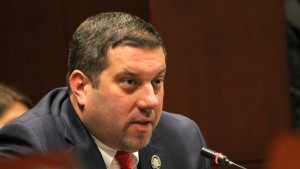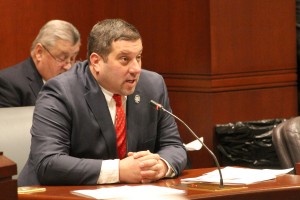Rep. Case pitches external solar panel shutoff switches
Posted on February 6, 2015
HARTFORD – A new proposal by State Rep. Jay Case requiring external shutoff switches for residential solar panels would protect firefighters already in harm’s way from electrocution.
 Case told the legislature’s Public Safety and Security Committee on Thursday that H.B. 5107 would minimize harm by providing current-disconnection switches, similar to circuit breakers on telephone poles that cut electricity to burning buildings. Solar panel disconnections are currently located within the residences, inaccessible to firefighters.
Case told the legislature’s Public Safety and Security Committee on Thursday that H.B. 5107 would minimize harm by providing current-disconnection switches, similar to circuit breakers on telephone poles that cut electricity to burning buildings. Solar panel disconnections are currently located within the residences, inaccessible to firefighters.
“While Connecticut citizens continue to benefit the environment and save on electricity costs by installing solar panels in their homes or businesses, these panels also pose substantial safety risks to our firefighters without the incorporation of effective safety regulations,” Case said.
“The bottom line is safety,” Case added. “I’m a huge proponent of alternative energy and cost-efficiency, but we also need to protect the very people who are risking their lives to protect us.”
In 2013, some 7,000 solar panels prevented New Jersey firefighters from effectively battling a 300,000 square-foot warehouse blaze. Fire officials, fearing electrocution, barred firefighters from donning the warehouse’s roof. Case’s proposal, a common-sense, preventative approach to fire safety, intends to prevent the same issue from popping up in Connecticut.
Fire officials being trained to treat solar panels like live wires also face lagging electrical code books which don’t yet reflect solar panel safety: the 2011 provisions were just approved recently but 2014’s haven’t been accepted.
Case’s proposal gained support from the Uniformed Professional Fire Fighters Association of Connecticut.
“It’s a smart move,” the union’s Director of Legislative and Political Affairs Rick H. Hart said. “Firefighters constantly put their lives at risk and they deserve to be safe. They deserve these precautionary devices.”
Thursday’s public hearing – allowing lawmakers to vet Case’s bill and seek ways to improve public safety statutes – was the next step in the proposal’s process. Committee members must vote on the bill before sending it to the Senate, the House, then to the Governor’s desk.